The average American spends more than 5 hours on their phones each day, and not only that, but studies have shown that nearly 50 percent of consumers purchase items based on “influencer” input. It’s hard to debate the success of influencer culture in recent decades.
Anglers are no exception.
Exotic destinations, the latest and greatest in gear, gadgets, how, where, and when to catch the most and biggest fish. Scroll after scroll; anglers are pounded by the icons of our pastime, selling us what we didn’t — yet — know we needed.
Over the last year, two of the largest names in fly fishing stepped up. They extended their advocacy beyond the usual fishing locations, techniques, or gear preferences by — as Theodore Roosevelt put it — stepping foot into the arena.
Kyle Schaefer and Hilary Hutcheson are redefining influence. They are prime examples of anglers leveraging their experience and knowledge to help secure the future of tomorrow’s fish — as well as tomorrow’s fishing, fishing culture, and fishing industry — from their greatest threat: the negative impacts of climate change. When speaking with them about their experiences on The Hill, one thing was clear: you can help, too.
“I want to be proud of what we leave to future generations, and that is why I am here in front of you today,” Schaefer of Soul Fly Outfitters told the US Senate Budget Committee in January of 2024 in a hearing titled “Warming Seas, Cooling Economy: How the climate crisis threatens ocean industries.”
Schaefer, a fishing guide, conservationist, and entrepreneur from the southern coast of Maine, presented very personal, experience-based testimony to the Committee, outlining the pervasive and growing impacts on game fish like striped bass, cutthroat trout, salmon and steelhead, lobsters, and more.
Forward to 23:49 to watch Kyle's testimony.
“Sentimental value was important when walking in with Senators,” Schaefer said. “If the value of my testimony was based on net worth, education, you name it, I’m outmanned. But they’re asking me what I do, and I’m the expert, no one can argue with my level of experience. That’s what really got me through my Senate hearing.”
For Senate testimony, Schaefer was selected and asked to testify by participating Senators who saw value in sharing his unique balance of fishing, commerce, and community within a balanced ecosystem. While he admits this was the largest stage he has been on, his getting there was made possible by a lifetime of engagement with fisheries policy and management.

“Conservation has always been a part of me, but it’s definitely a tool I had to sharpen,” Schaefer says. “I feel an intense connection to our land, our waters. When our planet is hurting, I’m hurting. I know that might not be relatable to everyone, we all have varying degrees of connections and that’s fine, but this is everywhere.”
Schaefer also acknowledged that what he feels is best for him, his family, fisheries, and community has also benefited his business.
“On a business level, it’s been satisfying, and it’s been successful,” Schaefer said. “By doing this work, by getting involved in this community, I’ve attracted the best clients. It’s been all about education for me. It’s cliche, but knowledge is power. Educating yourself and taking steps, even blindly, sometimes, towards doing what you know is the right thing. You’ll get there. We’ll get there. It takes trust in that process.”

“My businesses succeed only due to thriving, healthy ecosystems, and relatively predictable climate patterns,” Schaefer told the committee members. “A complicated combination of clean water, resilient habitats for fish and their prey, and well-managed fish stocks are all foundational elements that must be present for me to attract a strong base of clients. Whether you’re a fishing, hunting, or mountain guide, operator of a ski resort, or an equipment manufacturer, we must consider a changing climate as we analyze future opportunities and the continued viability of our current businesses. We’re an industry built on the appreciation and love for our wild spaces, in my case, the beautiful ocean and the fish that call these waters home.”

Hilary Hutcheson, operator of Montana’s longest-running guiding service, Glacier Anglers and Outfitters and owner and operator of Lary's Fly and Supply, has now presented to Congress multiple times. She compares angler advocacy, including testifying to Congress, to her career as a guide.
“Guides and outfitters don't generally like to put themselves on a soapbox, but we get asked, now more than ever, they’re asking, and we have the latest information and most honest opinion,” Hutcheson said. “Being an ‘influencer’ has taken on new meanings over the last decade. We often see influencers putting it out there on social media, telling us what we need when we don't ask for it. People are asking us; they want to know.”
“Professional anglers have a unique perspective on the far-reaching impacts of climate change. In all pockets of the country, anglers, angling businesses, and the broader outdoor economy are painfully impacted by the deterioration of our fisheries,” Hutcheson shared with the Senate Budget Committee in March of 2024.
Forward to 22:52 to watch Hilary's testimony.
Born in Oregon to parents both employed by the National Park Service, who relocated Hutcheson's family to Montana when she was 3 years old, conservation policy directing responsible management runs deep in Hutcheson’s roots.
“I am encouraged by the historic ability of the federal government to listen to outdoors people who are the voice of the river,” Hutcheson told the committee, using past bureaucratic successes to inspire opportunities for the future. “Specifically, I’m fueled every day by the enactment of the Wild and Scenic Rivers Act of 1968, which offers appropriate levels of federal protection to my cherished home waters. This legislation not only safeguards our rivers from development but also fosters economic vitality by recognizing unique rivers’ outstandingly remarkable values. I am profoundly grateful for the bipartisan river management that transcends political boundaries, fostering public participation in developing goals for river protection.”
“The Wild and Scenic River Act is responsible for me being able to do what I love to do every day,” Hutcheson said. “It was never my intent to be an advocate. That’s the price of doing business. I think guides and outfitters should know, if you want to be a professional in any way, you should know you’ve already entered the conservation conversation.”

There’s evidence that buffalo, when faced with an impending storm, walk directly into it instead of fleeing. Unlike cattle, which will turn and flee, buffalo have evolved to understand that while the going might be rough, the suffering will be over sooner if they face it head-on rather than exhausting themselves by hopelessly fleeing the inevitable storm.
We, as anglers, don’t have to wait to be called by a sitting U.S. Senator to speak up. There are myriad existing opportunities to impact fisheries management and climate policy to help secure a future for one of America’s greatest pastimes and our undying passion. Regional fisheries management councils depend on angler engagement. State fish and wildlife agencies are mission-bound and functionally built to serve their sportsmen and women constituents.
Whether you are an everyday angler focused on changes in fish migration and abundance due to warming ocean temperatures, a casual angler interested in habitat restoration to ensure opportunity when your time comes to get on the water, or simply a concerned member of a community that depends on healthy and vibrant fish populations, it is your experience that is needed, your testimony that needs to be heard, and your involvement that is required.
No one is coming to save our fish, our fisheries, or our fishing heritage. No one except us.
Schaefer and Hutcheson are running towards the storm. It’s time for the rest of us to join them.
Read AFFTA’S report: ‘For Tomorrow's Fish: Anglers are the Key to Climate-Resistant Fisheries’.
For more details on how to become involved in supporting Climate Resilient Fisheries policy and management, visit TomorrowsFish.Org.





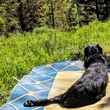
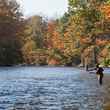
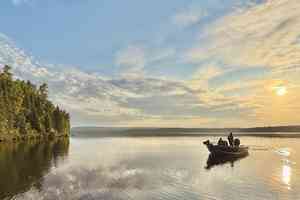


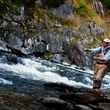
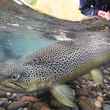
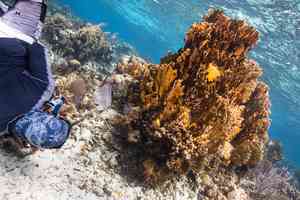

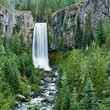
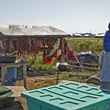



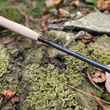




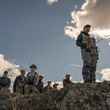
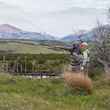
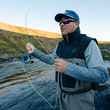
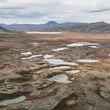

Comments
Anonymous replied on Permalink
Those two are legit. Glad to see them getting the attention they deserve for the right reason and for the right issue. Bravo.
Kim Tribe replied on Permalink
It's like pushing a truck up a hill on your own
James replied on Permalink
Great article on these two well done
Kerry replied on Permalink
I am indeed grateful to Hilary and Kyle and many, many others in the Outdoor State for their efforts to combat climate change. These two are great spokespeople!
Frank Lowry replied on Permalink
If we really care about the environment we should stop traveling around the world to go fishing. Fish your home waters. Clean up your home waters. Advocate for your home waters.
Anonymous replied on Permalink
Do these two accept the irony that their chosen profession requires unnecessary, discretionary travel to their destination by the "sports" they guide, which is a HUGE piece of this global problem? Until we accept we can't have our current excessive carbon footprint and stop traipsing the planet we are all just virtue signaling.
Jock Conyngham replied on Permalink
Pages